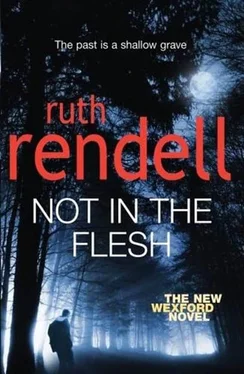“I doubt it,” said Burden and added, he who had seldom missed a meal in his entire life, “You just have to eat less. Easy-peasy.”
Nancy Jackson, as Burden put it afterward to Wexford, had done well for herself. If there was no comparison in his eyes with Matea, she was a good-looking young woman, blond, sharp-featured, dressed in the young woman's uniform of skin-tight jeans and short tank top which left a three-inch gap of bare tanned flesh. If not quite the best part of Sewingbury, the home she shared with her husband and two small sons was in a quiet tree-lined road where every house had a double garage attached to it. She was welcoming, frank, and cheerful. For a change, she was a woman who appeared to have nothing to hide and no chips on her shoulder.
She made Burden and Lyn a pot of tea and sat down with them at the teak table in her handsome kitchen, passing a plate of carrot cake slices and chocolate-chip cookies. Burden took a piece of cake; Lyn miserably succumbed to a cookie but refused milk in her tea.
“My twins are at school now,” she said. “They're just five and I've got to go and fetch them at half-three, but I can give you half an hour.”
“I believe you had a relationship with Peter Darracott, Mrs. Jackson,” Burden said.
He must have spoken in a deliberately discreet way as if lowering his voice would ensure this statement wasn't heard by flies on walls. Nancy Jackson burst into laughter. “You don't have to be careful what you say to me. Everyone knows I've been around the block a few times. Before I was married, I mean. Dave knows-that's my husband-and he says, ‘Well, I wasn't pure as the driven snow myself, darling,’ so you know what they say about the goose and the gander. But Pete Darracott. Of course he was married to that Christine, and as a general rule I gave married men a wide berth, but there was something about Pete. He was a postman, you know, hadn't got two pence to rub together.
“Me and my mum were living together, but she turned a blind eye to my goings-on. Pete and I used to pop around to our place in the afternoons. He wanted me to go away with him, you know, but I was a bit wary. We could go up to his sister in Wales, he said, Cardiff it was. And do what? I had asked. And he said-”
“Mrs. Jackson, when was this?”
“Oh, sure, it'd be a good idea to tell you that, wouldn't it? Have another biscuit,” she said to Lyn. “Yes, well, it'll have been May '95, end of May. He said he'd stop with his sister and find a job and a place to live and write to me. The idea was that I'd join him. Well, he went. We had a last afternoon together first. Mum had a friend stopping at our place so we couldn't go there. So what d'you think we did? We went to old Grimble's place, that bungalow. Grimble was like Pete's cousin. I never saw him, but he'd been around to Pete's house asking him to do him a favor, so we knew that bungalow was empty. It wasn't long after old Mr. Grimble had passed on, so it wasn't bad. The bed was all made up. It was okay for a quickie.” She broke off to giggle. “He just went off after that, said he'd write and tell me when he'd got a place, but he never did. I never heard a word, but to tell you the truth I didn't care that much. I'd met my Dave by then, and I sort of knew he was the one for me. You know, don't you, when that happens?”
Burden thought how much less offensive this woman's sex talk was than Claudia Ricardo's. “And you never saw him or heard from him again, Mrs. Jackson?”
“Never. There's just one thing. Grimble had asked Pete to help him dig a trench. I'll tell you about it. I've just got time before I pick up my twinnies.”
A man was kneeling on the floor at number 5 Oswald Road, examining the Grimbles' television set. Beside him on the floor, occupying the same sort of area as the armchair in which John Grimble habitually sat, was a large cuboid cardboard box. As Wexford and Hannah entered the room, led by Kathleen Grimble, the engineer, with the air of one breaking seriously bad news, remarked that he couldn't carry out repairs on the spot but would have to take the set away.
“You can't do that. What am I going to do without the telly?”
“Shouldn't be more than a day or two.”
“A day or two!” Grimble sat shaking his head in incredulity. “You'll have to give me a lend of one.”
“I'll have to see,” said the man in a hopeless sort of voice. “Give me a hand to get this into the box, will you? My back's not what it used to be.”
During the argument that ensued, Kathleen Grimble quietly offered her services and when she and the engineer had got the set into the box, she helped him drag it out to the front door. Grimble shouted after them, “I want a loan of a set, mind, and I want it today. If it's not here by five I'm coming down the shop. And I want one of them as hangs up on the wall.”
Wexford had been enjoying all this too much to interrupt, but now he did. “You didn't tell us you asked your cousin Peter Darracott-I beg your pardon, your second cousin-to help you dig that trench across your late father's garden.”
“I didn't,” said Grimble, “and why should I? He never done it. All he done was waste my time.”
“You'd know all about that. You've plenty of practice wasting ours. Tell us what happened. You went to Mr. Darracott's house in May 1995 and then what?”
“Go on, John,” said Kathleen, “do what the officer says. You've got nothing to hide, you know that.”
“That's why I don't want to do what he says,” said Grimble sullenly.
“If you won't, I will.”
Grimble seemed to be pondering his wife's words, perhaps thinking that if he left things to her, she might say more than was expedient.
“Come along, Mr. Grimble,” said Wexford. “If you don't want to go into it here we can always talk at the police station.”
This promise or threat had its usual effect. After staring in a kind of despair at the space that his television set had occupied, Grimble turned abruptly away and said in a rush, “I went around to his place, and his wife was there, Christine, she's called, and I said to Pete, ‘D'you want to come over and give me a hand digging a trench on my property at Flagford what my dad left me?’ And Pete said, ‘Digging it what for?’ And I said, ‘For putting in the main drainage for the new properties I'm building.’ I never said I hadn't got no planning permission. It was no business of his.”
“Just take it a bit more slowly, would you, Mr. Grimble?” said Hannah.
At fractionally less fast a pace, Grimble went on, “She said, that Christine that is, ‘He'd want paying,’ and he told her to keep out of it and none too soon if you ask me. There wasn't no call for her to be there in the first place. Pete said, ‘I'd have to go over and see it. I'm not letting myself in for a job like that on spec,’ so I said, ‘Okay,’ I said, ‘I'll run you over there tomorrow evening, right?’ ”
As Wexford said later to Hannah, that was the only instance they had ever heard or were likely to hear of Grimble showing the faintest scrap of altruism, and even then it was more for his own benefit than Peter Darracott's. “And did you?”
“It was a bloody waste of time. He said he would, but when the day come to start he never turned up, so I had to ask Bill Runge.”
Hannah asked him if he had ever seen Peter Darracott again. “Not after he let me down, no, I didn't.”
“Yes, you did, John,” said Kathleen Grimble. “You saw him when he come over to Dad's place and said he'd changed his mind, he'd help out on account of he needed the money, and you said, ‘Not on your nelly.’ It was when you'd finished the digging and the council said you couldn't build them houses. Must have been the sixteenth or seventeenth of June.”
Читать дальше











